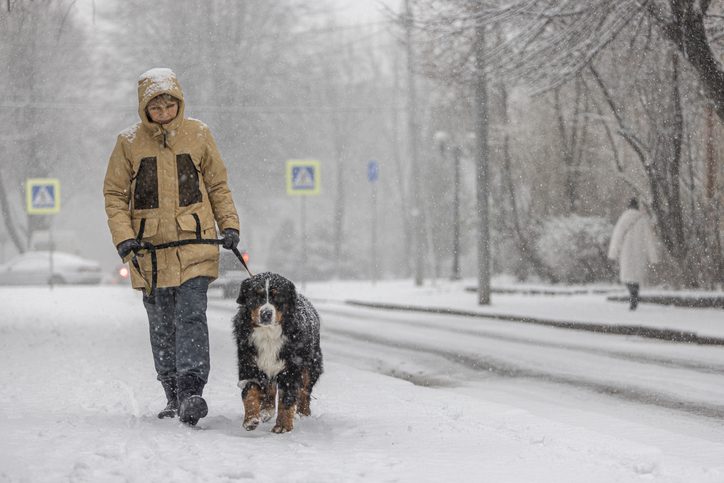Top 10 Common Winter Pet Emergencies in Dyer, IN

Winter is a difficult time for our pets, and they often face a variety of health issues due to the cold and wet weather. From frostbite to hypothermia to ice-related injuries, winter pet emergencies can be serious and require immediate attention. To help pet lovers and veterinarians be prepared for the worst weather, here is a list of the top 15 most common winter pet emergencies and how to recognize and treat them.
1. Injuries from Ice and Snow
Pets can be injured by ice or snow in minor to severe ways. For example, if a dog slips on ice and strains a muscle, or if an animal slips and breaks a bone, both can cause pain and discomfort. Cold exposure can also cause frostbite or hypothermia in animals.
What You Can Do
Pet owners need to pay extra attention to their animals during the winter months, as well as make sure that the animals are dressed in the right clothing and footwear to protect them from the cold and ensure that they do not slip while walking on the ice during the winter months. Ice and snow can obscure hazards such as sharp objects, so it is important to keep pets away from these areas or to clear the snow and ice away to reduce the risk of injury.
2. Over-Exertion
Overexertion in pets during winter is a common problem that can lead to serious injury and even death. Cold weather can cause pets to become exhausted due to their inability to regulate their body temperature efficiently. This can be especially dangerous for breeds with short coats or those with underlying medical conditions.
What You Can Do
Owners should be aware of the dangers of overexertion and take extra care to ensure their pet is not overworked during cold weather. This includes limiting outdoor activities and providing adequate shelter and warmth when inside.

3. General Illness
Winter can be a tough time for pets, as it can bring with it a range of illnesses. Cold weather can weaken a pet’s immune system, leading to an increased risk of infections. Common illnesses that can arise during the winter include kennel cough, upper respiratory infections, and even flea and tick infestations.
What You Can Do
It’s important to keep a close eye on your pet during the winter months to ensure they remain healthy and happy. Regular vet visits and vaccinations are important for the prevention and early diagnosis of any illnesses that may arise.
4. Anxiety and Stress
Winter can be a stressful and anxious time for pets. They can be affected by shorter days, colder temperatures, and changes in their routine.
What You Can Do
To help them cope, it is important to provide pets with extra attention, plenty of exercises, and a warm, calming environment. Veterinary consultations are also recommended if owners notice any signs of stress or anxiety.
5. Inadequate Shelter
Inadequate shelter for pets during the winter can cause serious health risks such as hypothermia, frostbite, or even death.
What You Can Do
Pets should always be provided with a warm, dry place to stay during cold weather to keep them safe and healthy.
6. Toxic Foods
Pet emergencies during the holidays can be especially dangerous because of the increased risk of exposure to toxic foods. Common holiday treats like chocolate, macadamia nuts, and alcohol can be highly toxic if ingested by pets. Also, mistletoe, holly, and poinsettias are dangerous if ingested by pets.
What You Can Do
It is important to keep these items away from pets and to seek veterinary help immediately if your pet ingests any of these items.
7. Ingesting Antifreeze
Pets ingesting antifreeze during winter is a serious concern. Antifreeze contains a chemical compound called ethylene glycol which is extremely toxic to pets and can cause kidney failure, vomiting, and even death.
What You Can Do
It is important to keep all antifreeze containers closed and stored out of reach of pets, as well as to clean up any spills immediately. If a pet has ingested antifreeze, it is important to seek veterinary care right away.
8. Paw Pad Injuries
Pets can experience paw pad injuries during the winter months due to the cold and icy ground. Certain surfaces like ice, snow and ice melt chemicals can irritate their paw pads, leading to redness, swelling, and even cracking.
What You Can Do
To prevent paw pad injuries, owners should trim their pet’s nails regularly and invest in a pair of booties for them to wear when going outside. After every walk, wipe their paws with a damp cloth to remove debris or chemicals they may have picked up.
9. Hypothermia
Pets are particularly vulnerable to hypothermia during the winter months due to their inability to regulate their body temperatures.
What You Can Do
Provide pets with adequate shelter and bedding, as well as warm clothing when necessary, to keep them warm and dry during cold weather. During cold weather, pet owners should never leave their pets in a car, as temperatures can drop quickly and cause hypothermia.

10. Frostbite
Pets frostbite is a serious condition that can occur in cats and dogs due to exposure to cold weather and freezing temperatures. Symptoms of pet frostbite include pale or gray skin, blisters, and swelling. If left untreated, pet frostbite can lead to serious infections and tissue death.
What You Can Do
It is important to take precautions to prevent pet frostbite by keeping pets warm and dry during cold weather, providing adequate shelter in cold temperatures, and limiting time outdoors in cold weather.
Last Thoughts
In winter, pets can face a range of challenges, from cold weather to snow, ice, and salt. It is important to keep them warm and dry by providing adequate shelter, bedding, and access to warm areas inside. Owners should also be sure to provide plenty of fresh, unfrozen water and maintain a balanced diet.
Brushing and grooming pets regularly can help to keep their coat in good condition and reduce the risk of skin issues. Lastly, pet owners should be aware of potential hazards such as antifreeze and chemicals used to melt ice. Taking the necessary precautions can help ensure that pets stay safe and healthy throughout the winter months.
Please give us a call at (219) 865-3737 for any questions regarding your pet’s health or to schedule an appointment with us! We are more than happy to help with whatever you may need here at Dyer Animal Clinic!
Share This Post
Recent Posts
About Dyer Animal Clinic
We are a place where pets and their people can feel at home. It's a place where wellness is maintained and supported from the time they’re newborns through their golden years.






